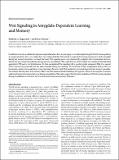Wnt Signaling in Amygdala-Dependent Learning and Memory
Author(s)
Maguschak, Kimberly A.; Ressler, Kerry J.
DownloadMaguschak-2011-Wnt Signaling in Amy.pdf (2.738Mb)
PUBLISHER_POLICY
Publisher Policy
Article is made available in accordance with the publisher's policy and may be subject to US copyright law. Please refer to the publisher's site for terms of use.
Terms of use
Metadata
Show full item recordAbstract
In addition to its role in cellular development and proliferation, there are emerging in vitro data implicating the Wnt/β-catenin pathway in synaptic plasticity. Yet in vivo studies have not examined whether Wnt activity is required for learning and memory. In the amygdala during fear memory formation, we found that many Wnt-signaling genes were dynamically regulated, with an immediate decrease, followed by an eventual normalization during memory consolidation. This rapid decrease in Wnt mRNA was confirmed with individual quantitative PCR and in situ hybridization. We then manipulated Wnt signaling with a specific peptide antagonist (Dkk-1) or agonist (Wnt1) injected stereotaxically into the adult amygdala during fear learning. We found that neither manipulation had an effect on locomotion, anxiety, fear acquisition, or fear expression. However, both Wnt modulators prevented long-term fear memory consolidation without affecting short-term memory. Dkk-1 and Wnt infusions had destabilizing, but opposite, effects on the requisite β-catenin/cadherin dynamic interactions that occur during consolidation. These data suggest that dynamic modulation of Wnt/β-catenin signaling during consolidation is critical for the structural basis of long-term memory formation.
Date issued
2011-09Department
Massachusetts Institute of Technology. Department of Brain and Cognitive SciencesJournal
Journal of Neuroscience
Publisher
Society for Neuroscience
Citation
Maguschak, K. A., and K. J. Ressler. “Wnt Signaling in Amygdala-Dependent Learning and Memory.” Journal of Neuroscience 31.37 (2011): 13057–13067. Web.
Version: Final published version
ISSN
0270-6474